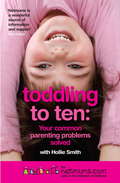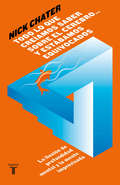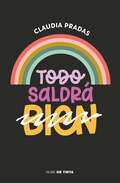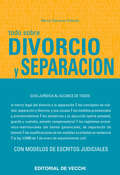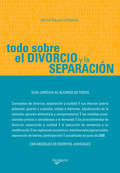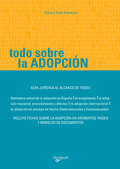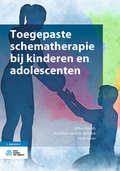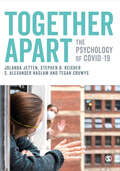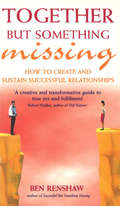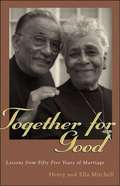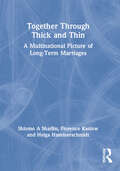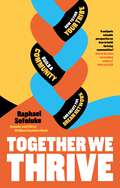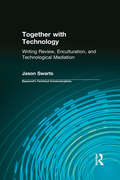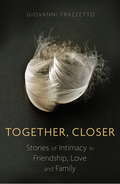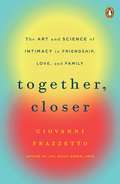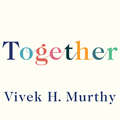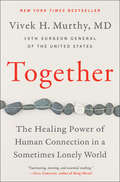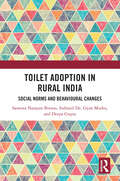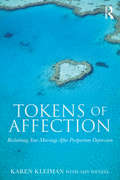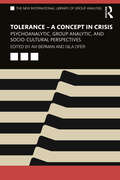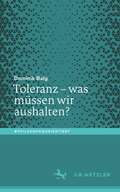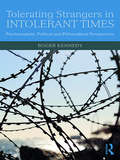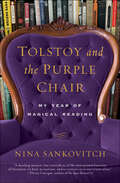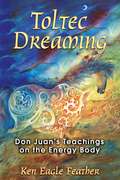- Table View
- List View
Toddling to Ten: Your Common Parenting Problems Solved: The Netmums Guide to the Challenges of Childhood
by Netmums Hollie Smith Siobhan FreegardHow do you avoid pyjama dramas and get a toddler to play ball at bedtime? How do you manage your child's time on the computer and kids who are couch potatoes? What do you do when your five year old starts telling lies? All the answers can be found in this comprehensive guide to coping with the challenges of childhood. A hand-selected panel of experts ranging from dentists to psychologists provide scholarly advice. But, crucially, there are hundreds of top tips and suggestions from other mums - the members of netmums.com, the rapidly-growing online community of mothers sharing valuable information on all aspects of childcare. It's real advice for real women, and is guaranteed to put the fun back into family life.
Todo lo que creíamos saber sobre el cerebro... y estábamos equivocados: La ilusión de profundidad mental y la mente improvisada
by Nick ChaterCon una interpretación radical sobre cómo funciona el cerebro, y ganador del Prose Awards 2019 en la categoría de psicología clínica, Nick Chater revela que la profundidad mental es sólo una ilusión. Asumimos que nuestras creencias y deseos surgen de las profundidades insondables de nuestra mente, y que si tuviéramos la llave para acceder a ese misterioso mundo, podríamos comprendernos en nuestra totalidad. Nick Chater llega a destruir este mito. Navegando en una nueva investigación en neurociencia, psicología del comportamiento y percepción, el especialista en comportamiento humano muestra que no existen esas profundidades para ser develadas ni tampoco el pensamiento inconsciente; sino que somos nosotros quienes generamos al instante nuestras propias ideas, motivaciones y pensamientos. Todo lo que creíamos saber sobre el cerebro... y estábamos equivocados nos lleva a descubrir, a través de ejemplos visuales y experimentos contraintuitivos, que somos los personajes de nuestra propia creación, improvisando constantemente nuestro comportamiento de acuerdo con nuestras experiencias en el pasado; y como Chater nos demuestra, reconociendo que esto puede ser liberador. «Un descubrimiento deslumbrante. Nick Chater me voló la cabeza.» Tim Harford, autor bestseller de El economista camuflado
Todo saldrá (bien)
by Claudia PradasClaudia P., le psicólogue de TikTok, aborda algunos de los problemas más frecuentes que afectan a los jóvenes y aporta recursos para solucionarlos Alexia siente unas emociones superintensas y muy difíciles de controlar que no la dejan tranquila. Marcos tiene depresión y no sabe dar con la solución a su problema. Samuel tiene días en los que no puede salir de la cama y días en los que se come el mundo; aunque, por suerte, él sí cuenta con un medicamento que lo ayuda a controlarse. Y Luna se mira al espejo y no se gusta, y cree que todo el mundo la observa. Como ellos, miles de jóvenes tienen dudas o miedos y sufren trastornos, y no saben dónde acudir para mejorar. A través de la vida de este grupo de adolescentes, Claudia P., le psicólogue de TikTok, aborda algunos de los problemas más frecuentes que afectan a los jóvenes y aporta recursos para solucionarlos.
Todo sobre divorcio y separación
by Mercè Tabuenca Petanàs* Los conceptos de nulidad matrimonial, separación y divorcio. * Los requisitos precisos para tramitarlas (injurias, abandono, cese de la convivencia, mutuo acuerdo, etc.) * Las consecuencias que implican (adjudicación de la patria potestad, guardia y custodia; pensiones compensatorias, etc.) * Los procedimientos judiciales más indicados para cada caso (separación o divorcio por mutuo acuerdo, medidas provisionales y provisionalísimas, etc.) * La ejecución de las sentencias y las medidas adoptadas ante su incumplimiento. * Los modelos de documentos para emprender las demandas, solicitar los convenios y presentar las alegaciones que se considerasen necesarias. El derecho de familia regula las relaciones entre los cónyuges y sus hijos, y proporciona pautas para la resolución de los conflictos de intereses. No obstante, es imposible atender todas las circunstancias y situaciones que influyen en cada uno de los casos. Por ello, en este libro, además de presentar las disposiciones jurídicas acerca del divorcio, la separación y la nulidad matrimonial, se dan las indicaciones para afrontar los problemas que surgieren en el transcurso de un proceso.
Todo sobre el divorcio y la separación
by Mercè Tabuenca PetanàsEl derecho de familia regula las relaciones entre los cónyuges y sus hijos, y proporciona pautas para la resolución de los conflictos de intereses. Pero es imposible atender todas las circunstancias y situaciones que influyen en cada uno de los casos. POr ello, en este libro, además de presentar las disposiciones jurídicas acerca del divorcio, la separación y la nulidad matrimonial, se dan las indicaciones para afrontar los problemas que pueden surguir en el transcurso del proceso.
Todo sobre la adopción
by Eduard Solé AlamarjaEsta guía expone de forma clara y sencilla los procesos jurídicos, técnicos y de tramitación de solicitudes para llevara a cabo la adopción de menores, tanto en España como en otros países.
Toegepaste schematherapie bij kinderen en adolescenten
by Jeffrey Roelofs Marjolein van Wijk-Herbrink Mieke BootsDit boek helpt zorgprofessionals bij het toepassen van schematherapie in de behandeling van kinderen, adolescenten, en hun ouders of (gezins)systeem. Het is bedoeld voor (klinisch) psychologen, psychotherapeuten en andere hulpverleners, en voor wie daarvoor een opleiding volgt. Toegepaste schematherapie bij kinderen en adolescenten biedt een breed overzicht van de toepassingsgebieden van schematherapie voor jeugdigen en hun gezins(systeem). Het laat eerst zien hoe de therapie inzicht geeft in de verschillende kanten (modi) en niet-adaptieve patronen die gedurende iemands leven zijn ontstaan. Vervolgens beschrijft het hoe schematherapie er in de praktijk uitziet voor verschillende doelgroepen, zoals jongeren met LVB of in de gesloten jeugdzorg. Telkens komen de technieken aan bod waarmee jongeren en hun omgeving geholpen kunnen worden om patronen te doorbreken en rekening te houden met de eigen behoeften en die van de omgeving.
Together Apart: The Psychology of COVID-19
by Jolanda Jetten S. Alexander Haslam Stephen D. Reicher Tegan CruwysWritten by leading social psychologists with expertise in leadership, health and emergency behaviour – who have also played an important role in advising governments on COVID-19 – this book provides a broad but integrated analysis of the psychology of COVID-19It explores the response to COVID-19 through the lens of social identity theory, drawing from insights provided by four decades of research. Starting from the premise that an effective response to the pandemic depends upon people coming together and supporting each other as members of a common community, the book helps us to understand emerging processes related to social (dis)connectedness, collective behaviour and the societal effects of COVID-19. In this it shows how psychological theory can help us better understand, and respond to, the events shaping the world in 2020. Considering key topics such as:LeadershipCommunicationRisk perceptionSocial isolationMental healthInequalityMisinformationPrejudice and racismBehaviour changeSocial DisorderThis book offers the foundation on which future analysis, intervention and policy can be built.We are proud to support the research into Covid-19 and are delighted to offer the finalised eBook for free.All Royalties from this book will be donated to charity.
Together Apart: The Psychology of COVID-19
by Jolanda Jetten S. Alexander Haslam Stephen D. Reicher Tegan CruwysWritten by leading social psychologists with expertise in leadership, health and emergency behaviour – who have also played an important role in advising governments on COVID-19 – this book provides a broad but integrated analysis of the psychology of COVID-19It explores the response to COVID-19 through the lens of social identity theory, drawing from insights provided by four decades of research. Starting from the premise that an effective response to the pandemic depends upon people coming together and supporting each other as members of a common community, the book helps us to understand emerging processes related to social (dis)connectedness, collective behaviour and the societal effects of COVID-19. In this it shows how psychological theory can help us better understand, and respond to, the events shaping the world in 2020. Considering key topics such as:LeadershipCommunicationRisk perceptionSocial isolationMental healthInequalityMisinformationPrejudice and racismBehaviour changeSocial DisorderThis book offers the foundation on which future analysis, intervention and policy can be built.We are proud to support the research into Covid-19 and are delighted to offer the finalised eBook for free.All Royalties from this book will be donated to charity.
Together But Something Missing: How to create and sustain successful relationships
by Ben RenshawPower struggles - Lack of communication - Unconscious needs - Fear of rejection - Different interests - Out of date habits - Fear of intimacy - High expectations - Too busy.If even one of these issues causes problems in your relationships, then this book is for you. As Britain's top personal development guru - and married himself - Ben Renshaw is able to throw strong light on what we can all do to improve our relationships, no matter what the problem. In his view there are ten principles of a successful partnership or marriage: Letting go of the past. Knowing what you want to say 'Yes' to. Realising that Now is New. Deciding how you want to be. Fearing less, talking more. Sexual healing. The inevitability of change. Living a life of gratitude. Making love more important than the relationship. Remembering the spirit zone. Full of thoughtful, realistic advice, this is the book no caring, sharing person can afford not to read.
Together For Good: Lessons from Fifty Five Years of Marriage
by Henry H. Mitchell Ella P. MitchellThe book tells how the Mitchells coped with the first year of marriage, financial problems, the birth and adoption of their children, switching jobs, and moving.
Together Through Thick and Thin: A Multinational Picture of Long-Term Marriages
by Florence Kaslow Shlomo A SharlinDiscover what factors, beliefs, and attitudes build a successful marriage!In the enormous social, political, and technological upheavals since World War I, the long and happy marriage has begun to seem like an endangered species. In the desperate hunt for reasons that marriages fail, most researchers have ignored the factors that help marriages succeed. Together Through Thick and Thin: A Multinational Picture of Long-Term Marriage reports a landmark study of long-term satisfaction in marriage. Instead of relying on conjecture or unproven clinical hunches, the authors studied the happily married around the world. The respondents’early experiences included the Great Depression, World War II, and the Holocaust as well as the Roaring Twenties. In the years since they married, technological change and the women's movement have made the world almost unrecognizable. Yet these people have managed to maintain both stability and quality in their marriages. The scope of Together Through Thick and Thin is sweeping: eight countries, more than 400 couples who had been happily married for between 25 and 45 years. Factors analyzed include degree of satisfaction, gender differences, socioeconomic level, family history, shared values, religious belief and practice, attitudes toward children, physical health, and problem-solving styles, among many others. Moreover, the book builds on existing documented literature on marriage. This solid background helps put its wealth of practical data into context, an ideal synthesis of theory and practice.This study delves into the reasons couples stay together and stay satisfied. What qualities and attitudes do happily married couples share? Can the factors that keep a Chilean couple together for life also apply in the very different cultures of Sweden, Israel, South Africa, the United States? What keeps a marriage together in times of crisis? How important is love?Together Through Thick and Thin helps you understand the diverse factors that affect marital quality and stability by offering a broad range of information:a comprehensive review of the literature of happy marriage cross-cultural comparisons that kindle fresh insights discussions of factors ranging from gender and economic status to family history and shared attitudes specific behaviors and attitudes that illuminate what matters most in marriage, from mutual respect to shared fun the reasons couples stick together during crises which problem-solving behaviors actually workTogether Through Thick and Thin provides psychologists, family therapists, and couples counselors with the solid data they need to guide couples in crisis toward greater intimacy, commitment, and joy together.
Together We Thrive: How to find your tribe, build a community and create the dream network
by Raphael Sofoluke‘Raphael has an experience few can equal. His book offers a uniquely valuable perspective on how to build thriving communities!’ Steven Bartlett, bestselling author of Diary of a CEOWe live in a world of individualism, where people act in their own interests, striving for their own success. Our focus on self-development means we’ve overlooked a vital and transformative power.In Together We Thrive, Raphael Sofoluke, Founder and CEO behind UK Black Business Show and UK Black Business Week, reveals the immense potential of harnessing a community.You’ll learn how to nurture the connections that will become your currency and build relationships that will fuel your success. Your network speaks louder than you can, amplifies your story, mission and values, and is more resilient than you could ever be on your own. Packed with insights and inspiration from Sofoluke and his own community of highly successful people, Together We Thrive will help you find a tribe of invaluable supporters who will hold you to account and make sure that you reach your full potential.If you want to go far, you have to go together.
Together with Technology: Writing Review, Enculturation, and Technological Mediation (Baywood's Technical Communications)
by Jason SwartsThis book examines the complex roles that texts serve as parts of an organizational cognitive infrastructure. Texts make knowledge and experience tangible and durable. They help shape interactions between people. As professions have become more writing-centered in recent decades, many organizations have instituted writing review practices to help newcomers produce better writing and thus become more effective organizational citizens.Dr. Swarts examines those writing review practices and questions whether available supportive technologies adequately prepare professional writers and professionals who write to appreciate the complex functions their texts serve. He reports on a study of the impact of two technologies (paper text and textual replay) on writing review. Unlike paper, which presents texts in a static form, textual replay presents texts as the products of writing practices. Textual replay records onscreen writing activity and creates a video that writers and reviewers use to supplement their discussion of revisions.
Together, Closer: Stories of Intimacy in Friendship, Love, and Family
by Giovanni FrazzettoA deeply felt book that explores intimacy through the stories of eight relationships, from a leading neuroscientist and author of How We Feel.What is intimacy and why do we need it?Intimacy is that moment when our true identity is revealed to another, when traumas, fears, and ambitions are shared. Whether in friendship, love or family, intimacy redresses itself constantly, demanding we raze emotional barriers and discover who we really are. Through the ordinary stories of eight relationships, neuroscientist Giovanni Frazzetto has woven an extraordinary narrative of togetherness. He shares the details of romantic partners trapped in a long cycle of attraction and rejection, a single woman who finds herself deep in a fictional relationship with a boyfriend she has invented out of frustration with her love life, and a couple absorbed in a years-long clandestine affair. But intimacy can also extend beyond romantic encounters: coping with the loss of a loved one, dealing with overbearing or emotionally distant parents, or celebrating the joys and comforts of our dearest friends. In Together, Closer, Frazzetto unravels the components of intimacy in all of these relationships, illuminating the mysteries, challenges, and pleasures of intimacy through a brilliant mix of storytelling and science.
Together, Closer: The Art and Science of Intimacy in Friendship, Love, and Family
by Giovanni FrazzettoFor readers of Oliver Sacks and Stephen Grosz, a wondrous, deeply felt book that explores intimacy through the stories of eight relationships, from the author of Joy, Guilt, Anger, Love The bonds we are capable of feeling toward other people—how we know and belong to one another—provide fascinating glimpses into the intricacies of human behavior. Intimacy is that moment when our true identity is revealed to another, when traumas, fears, and ambitions are shared. Through the ordinary stories of eight relationships, Giovanni Frazzetto has woven an extraordinary narrative of togetherness. He shares the details of romantic partners trapped in a long cycle of attraction and rejection, a single woman who finds herself deep in a fictional relationship with a boyfriend she has invented out of frustration with her love life, and a couple absorbed in a years-long clandestine affair. But intimacy can also extend beyond romantic encounters: coping with the loss of a loved one, dealing with overbearing or emotionally distant parents, or celebrating the joys and comforts of our dearest friends. In Together, Closer, Frazzetto unravels the components of intimacy in all of these relationships, illuminating the mysteries, challenges, and pleasures of intimacy through a brilliant mix of storytelling and science. Praise for Giovanni Frazzetto’s Joy, Guilt, Anger, Love: “In Frazzetto’s book, the Italian researcher and writer offers a fine primer on six emotions plus empathy. But before diving into the biology of each emotion (the role of the amygdala in fear and of serotonin reuptake in grief), he inspects his target through the lenses of psychology, philosophy, art, and personal experience. What you see is that poetry offers more insight into our feelings than does neuroanatomy or biochemistry.” —The Washington Post
Together: Loneliness, Health and What Happens When We Find Connection
by Vivek H. Murthy'The most important book you'll read this year.' DANIEL H. PINK, author of Drive'Together stands with Atul Gawande's classic, Being Mortal.' MALCOLM GLADWELL, author of Outliers'A welcome beacon towards meaningful connection' ARIANNA HUFFINGTON, author of Thrive'Fascinating, moving and essential reading.' ATUL GAWANDE, author of Being Mortal'This book is a gift' SUSAN CAIN, author of Quiet'Exactly what the doctor ordered' ANGELA DUCKWORTH, author of GritThe world seems more connected than ever, and yet loneliness is at epidemic levels. But what effect is it having on us, and how can we treat it - even at a distance?When Obama appointed him Surgeon General of the United States, Dr Vivek Murthy observed the growing health crisis of isolation first-hand. In this ground-breaking book, he traces the roots of the problem, and shows how loneliness lies behind some of our greatest personal and social challenges, from anxiety and depression to addiction and violence. But he also reveals the cure. His search led him to talk to doctors, scientists, parents and community members around the world. The solutions are deceptively simple and easily applicable - and the effects are transformative. And one thing is clear: real human connection is a medical necessity if we want to stay healthy. We can all create it, and benefit from it, and it is more urgent than ever that we start now.
Together: The Healing Power of Human Connection in a Sometimes Lonely World
by Vivek H MurthyIn this groundbreaking book, Former Surgeon General of the United States, Vivek Murthy argues that loneliness is the underpinning to the current crisis in mental wellness and is responsible for the upsurge in suicide, the opioid epidemic, the overuse of psych meds, the over-diagnosing and pathologizing of emotional and psychological struggle. <P><P>The good news is that social connection is innate and a cure for loneliness. In Together, the former Surgeon General will address the importance of community and connection and offer viable and actionable solutions to this overlooked epidemic. <P><P><b>A New York Times Bestseller</b>
Toilet Adoption in Rural India: Social Norms and Behavioural Changes
by Indranil De Saswata Biswas Gyan Mudra Deepa GuptaThis book examines sanitation and toilet access across rural India, focusing on psychological, socio-cultural, infrastructural, and normative barriers to the initiative of Swachh Bharat Mission (SBM). While sketching the evolution of sanitation policies in India, it assesses their impact on sanitation behaviour. It also studies the implications of variations in caste, religion, and geography on toilet usage across Indian states.By analysing data from various states and intensive micro-level studies of three states, i.e., rural Bihar, Gujarat, and Telangana, this volume: Suggests that socio-cultural factors are as significant as economic factors in shaping sanitation behaviour; Argues that the concepts of cleanliness and pollution are often determined by the social-cultural context, rooted in historical events that have shaped traditional beliefs and ideas about space; Explores gendered perspectives on the usage of and access to toilets; Highlights the limited effectiveness of Information, Education, and Communication (IEC) programs in encouraging toilet adoption and emphasizes the need for information dissemination at the ground level; Gives recommendations for enhancing the adoption of toilets in rural India, including provision for more than one toilet per household, uninterrupted access to water, and behavioural change to combat open defecation. This book will be useful to students studying sociology, psychology, social work, and development studies. It will also be an invaluable companion to NGOs, social workers and activists actively involved in water, sanitation, and hygiene. Moreover, this book holds immense value as a pivotal resource and point of reference for policymakers engaged in rural development with a specific focus on Sustainable Development Goals.
Tokens of Affection: Reclaiming Your Marriage After Postpartum Depression
by Amy Wenzel Karen KleimanPostpartum depression is hard on a marriage. In their private practices, authors Karen Kleiman and Amy Wenzel often find themselves face-to-face with marriages that are suffocating, as if the depression has sucked the life out of a relationship that was only prepared for the anticipated joy of pending childbirth. What happens to marriage? Why do couples become angry, isolated, and disconnected? Tokens of Affection looks closely at marriages that have withstood the passing storm of depression and are now seeking, or in need of, direction back to their previous levels of functioning and connectedness. The reader is introduced to a model of collaboration that refers to 8 specific features, which guide postpartum couples back from depression. These features, framed as “Tokens,” are based on marital therapy literature and serve as a reminder that these are not just communication skill-building techniques; they are gift-giving gestures on behalf of their relationship. A reparative resource, Tokens of Affection helps couples find renewed harmony, a solid relational ground, and reconnection.
Tolerance – A Concept in Crisis: Psychoanalytic, Group Analytic, and Socio-Cultural Perspectives (ISSN)
by Avi Berman Gila OferThis book examines tolerance as a concept under crisis, exploring its origin and functions, and how it can be at risk of replacement by moral intolerance or retributive justice in turbulent societies.Tolerance - A Concept in Crisis considers the contributions that can be made to understanding and elaborating tolerance, and its counterpart intolerance, by psychoanalysis and group analysis. The contributors, representing a range of countries, backgrounds, and specialisms, consider five key themes: conceptual and emotional challenges, tolerance and psychoanalysis, tolerance and group analysis, tolerance and the socio-political, and tolerance and intolerance in organizations and institutes. The project suggests that tolerance is an outcome of developmental processes (emotional, intrapsychic, intersubjective, and social) to agree and contain disagreement as part of mutual belonging. It also considers how it might be taken too far. The concept of tolerance is examined through its valid contributions to diversity and reduction of discrimination, promoting reflexive scepticism, critical pluralism, and durable forgiveness.Tolerance - A Concept in Crisis will be of great interest to psychoanalysts and group analysts facing issues of conflict and its resolutions, as well as other professionals who are seeking new perspectives on tolerance.
Toleranz – was müssen wir aushalten? (#philosophieorientiert)
by Dominik BalgToleranz – eine Haltung, die in westlichen Gesellschaften wie kaum eine andere mit Nachdruck gefordert und mit Vehemenz verteidigt wird. Insbesondere eine tolerante Haltung gegenüber fremden Ansichten, Standpunkten und Überzeugungen wird von vielen als unverzichtbare Bedingung für das Gelingen eines demokratischen Miteinanders angesehen. Gleichzeitig wird kontrovers diskutiert, wo eigentlich die Grenzen einer toleranten Pluralität verschiedener Meinungen gezogen werden sollen. Welche Ansichten sind noch tolerabel, und welche nicht? Mit Blick auf aktuelle gesellschaftliche Diskurse und vor dem Hintergrund umfassender Kenntnisse der philosophischen Toleranzforschung überprüft Dominik Balg kontrovers diskutierte Minderheitenpositionen auf ihre Tolerierbarkeit und entwickelt vor diesem Hintergrund einen klaren Kriterienkatalog, mit Hilfe dessen sich die Grenzen einer toleranten Haltung sinnvoll ziehen lassen. Darüber hinaus widmet er sich der Frage, was eigentlich jenseits unserer Toleranzgrenzen liegen sollte und wie man verantwortungsvoll mit Positionen umgehen kann, die nicht mehr tolerabel sind.
Tolerating Strangers in Intolerant Times: Psychoanalytic, Political and Philosophical Perspectives
by Roger KennedyIn this interdisciplinary and wide-ranging study, Roger Kennedy looks at the roots of tolerance and intolerance as well as the role of the stranger and strangeness in provoking basic fears about our identity. He argues that a fear of a loss of attachment to one’s home might account for many prejudiced and intolerant attitudes to refugees and migrants; that basic fears about being displaced by so-called ‘strangers’ from our precious and precarious sense of a psychic home can tear communities apart, as well as lead to discrimination against those who appear to be different. Present day intolerance includes fears about the ‘hordes’ of immigrants confused with realistic fears about terrorist attacks, populist fears about loss of cultural integrity and with it a sense of powerlessness, and fearful debates about such basics as truth, including the so-called ‘post truth’ issue. Such fears, as explored in the book, mirror old arguments going back centuries to the early enlightenment thinkers and even before, when the parameters of discussion about tolerance were mainly around religious tolerance. There is urgency about addressing these kinds of issue once more at a time when the ‘ground rules’ of what makes for a civilized society seem to be under threat. Kennedy argues that society needs a ‘tolerance process’, in which critical thinking and respectful judgment can take place in an atmosphere of debate and reasonably open communication, when issues around what can and cannot be tolerated about different beliefs, practices and attitudes in people in our own and other cultures, are examined and debated. Tolerating Strangers in Intolerant Times, with the help of psychoanalytic, literary, social and political thinking, looks at what such a tolerance process could look like in a world increasingly prone to intolerance and prejudice. It will appeal to psychoanalysts as well as scholars of politics and philosophy.
Tolstoy and the Purple Chair: My Year of Magical Reading
by Nina Sankovitch“A dazzling memoir that reminds us of the most primal function of literature—to heal, to nurture and to connect us to our truest selves.” —Thrity Umrigar, author of The Space Between UsCatalyzed by the loss of her sister, a mother of four spends one year savoring a great book every day, from Thomas Pynchon to Nora Ephron and beyond. Nina Sankovitch’s soul-baring and literary-minded memoir is a chronicle of loss, hope, and redemption. Nina ultimately turns to reading as therapy and through her journey illuminates the power of books to help us reclaim our lives.“Intelligent, insightful and eloquent, Sankovitch takes the reader on the literary journey. . . . As a bonus, even the well-read reader will be inspired to explore some of the books from this magical year.” —Kirkus Reviews, starred review“The beauty of her project lies in seeing how books intertwine with daily life, how very much they affect our moods, interactions, and, especially important for Sankovitch, how we recover and process our memories.” —Los Angeles Times“Through the stories of her own family, Nina Sankovitch shows how books have the power to refresh, renew, and even heal us.” —Julie Klam, New York Times bestselling author of You Had Me at Woof“[An] entertaining bibliophile’s dream. . . . Sankovitch champions the act of reading not as an indulgence but as a necessity, and will make the perfect gift from one bookworm to another.” —Publishers Weekly“There is much to learn from this moving book.” —Chitra Banerjee Divakaruni, author of One Amazing Thing“Anyone who has ever sought refuge in literature will identify.” —O magazine“A beautifully paced look at how mindfulness can affect the psyche.” —Shelf Awareness, starred review
Toltec Dreaming: Don Juan's Teachings on the Energy Body
by Ken Eagle FeatherA metaphysical instruction manual on the role of dreaming in the Toltec tradition • Describes the energy body, its modes of perception, and how it produces dreaming • Provides an outline of the dream gates showing how they correspond to the chakras • Includes detailed instructions for awakening dreaming potential and for exercising and expanding the dreaming body--what to expect and how to respond Toltec Dreaming explores the many aspects and levels of the dream-state, distinguishing ordinary dreaming from “dreaming awake,” a condition of heightened awareness through which the active dreamer ascends to the Dream of Transcendence. In this book, Ken Eagle Feather presents the history of dreaming’s place within the Toltec tradition and provides a practical how-to manual for achieving and maximizing dreaming potential. The Toltec Way superimposes on the waking world the subtle physics of the dream world in order to create a conscious dreaming body, often referred to as an “out-of-body experience,” that can allow anyone to use dreaming as a vehicle to higher consciousness. Once the dreaming energies are fully awakened, unbounded conscious perception can come alive, whether one is in the world of dreams or in daily life. The author shows how to communicate while in the dreaming body and indicates what one may encounter in the dream. He also identifies barriers to dreaming and includes instructions for detaching the dream body from the waking ego. Filled with techniques that stimulate dreaming and the development of the dreaming body, this book will guide practitioners along the Toltec Way of the Dream.
